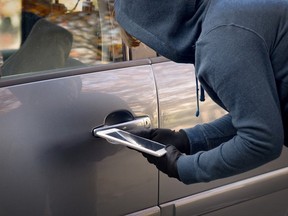If you’re in the market to buy a vehicle, you need to read this column

That’s a big change of hardware in a few short months. Look for it to grow over the coming year.
Should you switch insurance companies?
Broker Debbie Arnold has some words of caution: “Consumers should not flip out when they get their renewal. Not every carrier surcharges the same vehicles. For example, Wawanesa surcharges the Honda Accord, but Pembridge does not. Before changing insurers over a theft surcharge, ask the broker if the carrier you’re moving to is caught up on claims. Carriers are still feeling the squeeze of the great resignation from Covid and many claims departments are understaffed. The average caseload for adjusters is 190 claims each. This is unsustainable.”
Nobody is ever going to feel sorry for an insurance company, but it’s good to know you’re moving for the right reason and understand that changes are being made weekly.
Insurers are relying on statistics from law enforcement, and many of their highlighted vehicles are featured on things like Equite’s Most Stolen Vehicles lists. Elliott Silverstein, director of government relations with CAA has a word of caution, however. “Don’t think that because your vehicle isn’t currently on a ‘most stolen’ list means it’s safe. Things can change quickly.”

The key programmer CTV bought and tested is the device “that can be seen on some surveillance videos, with thieves huddled over their tablet screens, usually with a cable plugged into the car’s computer.” The problem for law enforcement? “They can also be used legitimately by car owners looking to get new keys or find faults with their vehicles.” They’re also tools used by legitimate locksmiths. No matter how much you try to outlaw devices that are readily available to consumers, you can’t track how they will ultimately be used. It’s a desperate game of Whack-a-Mole, and thieves know it.
“Law enforcement is at capacity,” says Silverstein. “We need federal legislation that reflects the current standards of security. It’s got to be an ongoing thing; it’s not one-and-done.” With legislation in place, he would then expect manufacturers to step up and make their vehicles harder to steal, and to be required to update those systems as the technology evolves.
“The current standards were set in place when everyone had a Palm Pilot or a Blackberry in their hand,” he explains with a laugh. “I need to two-factor authentication to get a pizza, but not to take a car?” He believes consumers are more than familiar with and willing to adapt to better measures to protect what is often their second-largest possession. “We use two-factor for banking, for the CRA, for nearly every website. This is not foreign to the general public.”
CAA is the one insurer who has taken a different approach to combat theft. Instead of requiring tracking devices to waive surcharges, they focus on prevention. Immobilizers, kill switches, and various locking systems – including the familiar Club – will all whittle down that surcharge. Silverstein wants the vehicle to not be stolen in the first place and considers tracking systems to be an additional pressure on law enforcement that could be prevented if the vehicle couldn’t be stolen in the first place.

Nobody is saying consumers don’t have a duty to better protect their property. Silverstein says two in 10 still don’t lock their cars, and he thinks if you’re lucky enough to have a garage, you should probably be able to put up a shed for all the junk in your garage and tuck your car away. “We shouldn’t be talking about ‘today’ solutions for a long-term problem We’re in the bottom of the third ad there is a lot more to go,” he says.
We’re all just trying to get the thieves to take someone else’s car. But ultimately, none of those cars should be so easy to steal.
Sign up for our newsletter Blind-Spot Monitor and follow our social channels on X, Tiktok and LinkedIn to stay up to date on the latest automotive news, reviews, car culture, and vehicle shopping advice.